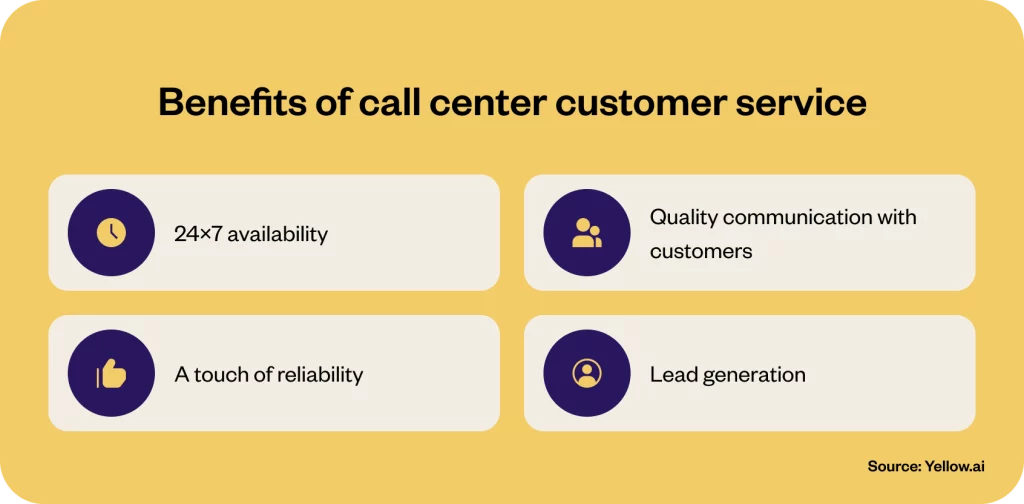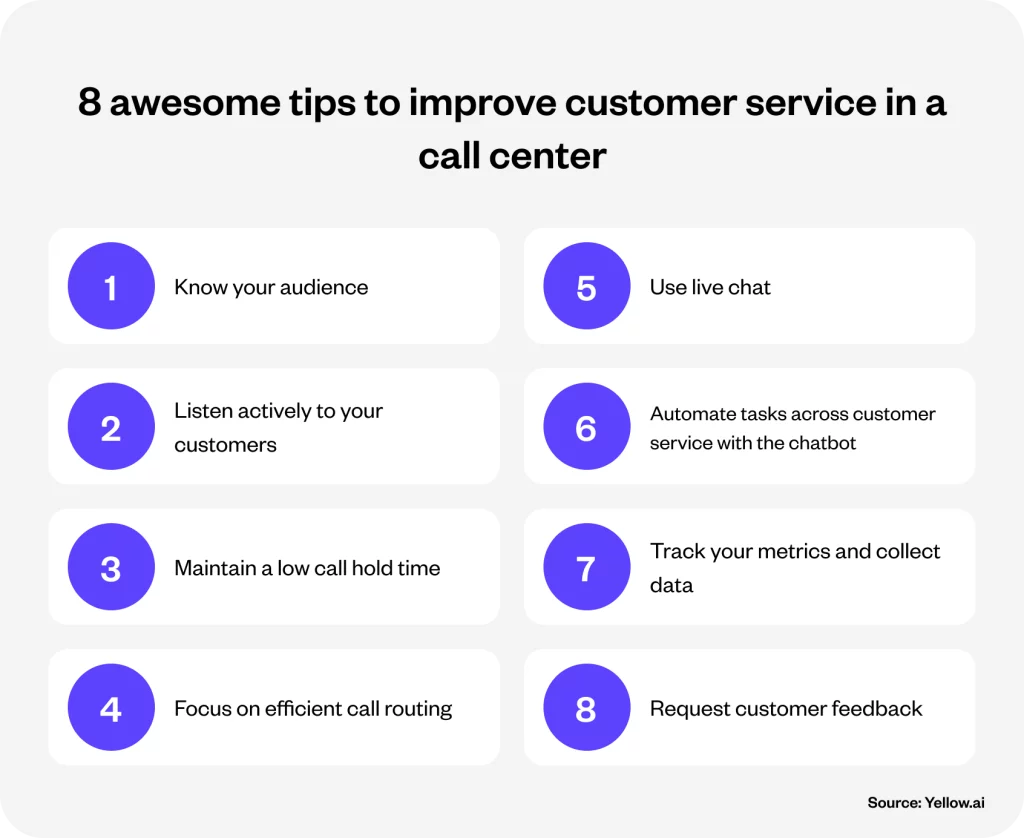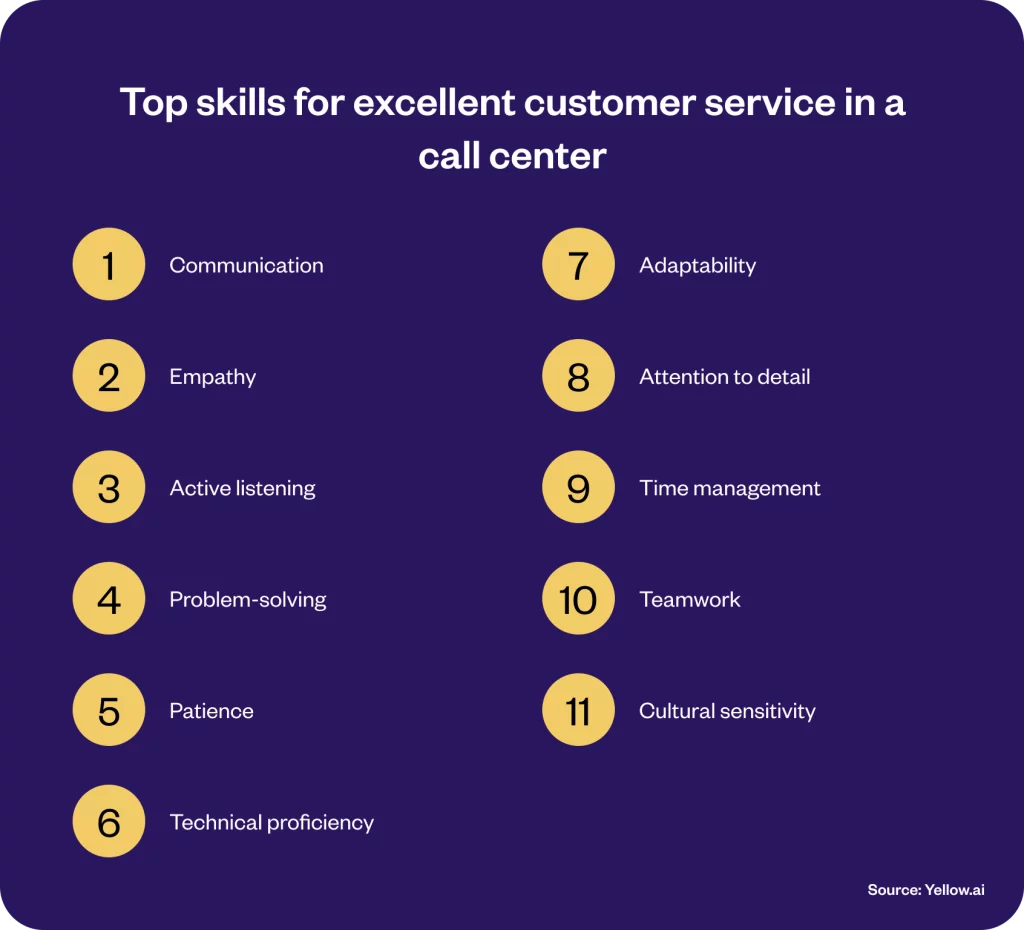Executive summary
Dive into the core of call center excellence with our blog. This blog illuminates customer service essentials within call centers, highlighting innovative strategies to enhance service quality. Discover how to revolutionize your call center operations, ensuring every customer interaction becomes a benchmark for industry-leading service. We explore the significance of adapting to modern customer service paradigms, focusing on practical measures to enhance customer service.
In the bustling world of call centers, where every call is an opportunity to build or break customer trust, customer service becomes not just important but critical to business success. It’s a dynamic landscape where the voice at the end of the line can transform customer perceptions and influence decisions. As businesses evolve in a digital-centric market, the fusion of human touch with technological prowess in call centers is more than just a trend; it’s the backbone of customer satisfaction and loyalty.
The stakes are high in the call center industry, underscored by the Salesforce study indicating that 88% of customers prioritize service quality as much as the product itself. In this high-stakes environment, the integration of advanced technologies like AI enhances operational efficiency and personalizes customer interactions, ensuring responsive, empathetic, and tailored service.
This blog is a comprehensive roadmap for businesses aiming to harness the full potential of their call centers, ensuring they become powerhouses of exceptional customer service and relational depth.
Related must-reads:
- The complete guide to customer service best practices
- Customer service automation: Benefits and examples
- Call center software – A Complete Guide [2024]
- 31 Call center metrics and KPIs to enhance the CX
What is customer service in a call center?
A call center’s customer service acts as the bridge connecting a company with its clientele. It’s where voices on both ends of the line converge to solve problems, provide guidance, and enhance the customer journey. This service isn’t just about picking up calls; it embodies the company’s dedication to customer satisfaction, showcasing how valued each customer is through every interaction.
At its core, customer service in a call center is about fostering a seamless and positive experience for every caller. It’s the art of turning queries into solutions and challenges into opportunities, ensuring that every customer feels heard and helped. This aspect of business isn’t just operational; it’s a strategic tool that can significantly sway customer loyalty and brand perception, making or breaking the long-term relationship between a business and its customers.
For companies, the stakes are high in their call centers. It’s not just a support hub; it’s a strategic asset that can drive business growth. A call center’s effectiveness in managing customer interactions is a litmus test for the company’s customer-centricity. It reflects how a business values its customers and is often a deciding factor in building sustained customer loyalty. By prioritizing effective and empathetic customer service in call centers, businesses are not just solving immediate issues but are building a foundation for lasting customer relationships and continued business success.
Related read: 31 Call center metrics and KPIs to enhance the CX
Types of call center services
Navigating the intricate world of call center services reveals a spectrum of operations tailored to meet diverse customer needs. These services are pivotal for businesses, acting as the frontline of customer interaction and playing a crucial role in shaping the customer experience. Here’s a breakdown of the primary types of call center services and their significance for businesses:

1. Inbound call center services
Inbound call centers are the heart of customer service operations, where agents respond to incoming calls from customers. These centers are essential for businesses aiming to provide immediate support, resolve customer inquiries, and maintain high satisfaction levels. Services typically include:
- Customer support and helpdesk: Offering solutions to customer queries and problems, enhancing customer satisfaction and loyalty.
- Technical support: Providing specialized assistance for products or services, which is crucial for maintaining operational efficiency and customer trust.
- Order taking and processing: Facilitating smooth transactions and ensuring a positive buying experience, directly impacting sales and revenue.
- Appointment scheduling: Organizing and managing appointments is crucial for businesses that operate on a scheduled service model.
2. Outbound call center services
Outbound call centers focus on initiating calls to customers or prospects, playing a strategic role in sales, marketing, and customer relationship management. Key services include:
- Telemarketing and sales: Actively reaching out to potential and existing customers to promote products or services, drive sales, and expand market reach.
- Customer surveys and feedback: Gathering valuable insights into customer preferences and experiences, informing business strategies and improvements.
- Debt collection: Managing the recovery of overdue payments is vital for maintaining cash flow and financial stability.
3. Hybrid call center services
Hybrid call centers blend inbound and outbound functions, offering a versatile approach to customer service. This model allows businesses to respond to incoming queries while proactively engaging with customers, providing a comprehensive service experience.
4. Multichannel and omnichannel services
- Multichannel: Operate across multiple independent channels such as phone, email, and social media, offering customers various ways to interact with the business.
- Omnichannel: Provide a seamless customer experience across all channels, ensuring continuity and consistency in customer interactions, which is crucial for building long-term customer relationships.
Benefits of call center customer service
Delving into the benefits of call center customer services offers many advantages that can significantly enhance a business’s operational efficiency and customer satisfaction. Understanding these benefits showcases the value of investing in call center services and aligns with businesses’ strategic goals. Here are some key benefits:

1. 24×7 availability
The round-the-clock operation of call centers ensures that businesses are always accessible to their customers, regardless of time zones or geographic boundaries. This constant availability is crucial in today’s global market, where customers expect immediate responses and support. Being available 24/7 means that businesses can cater to customer needs promptly, reducing wait times and improving the overall customer experience. This reliability can be the deciding factor for customers when choosing between competitors, making it an invaluable asset for businesses aiming to stand out in crowded markets.
2. Quality communication with customers
Call centers specialize in managing large volumes of customer interactions, ensuring that each communication is handled with the highest quality and efficiency. By having dedicated personnel trained in customer service, businesses can ensure that their customers receive consistent, professional, and personalized service. This quality communication helps build strong customer relationships, foster trust, and enhance brand reputation. It’s not just about answering calls; it’s about providing solutions, offering support, and creating positive experiences that customers remember and appreciate.
3. A touch of reliability
Having a dedicated call center enhances a business’s perceived reliability. When customers know they can easily reach out and receive prompt assistance, their trust in the brand solidifies. This reliability factor extends beyond just resolving issues; it encompasses the entire customer journey, from pre-sales inquiries to post-purchase support. A reliable call center service can transform customer perceptions, turning one-time buyers into loyal, long-term clients who feel valued and understood.
4. Lead generation
Call centers are not just cost centers; they are strategic assets that can actively contribute to business growth through lead generation and sales activities. Outbound call centers, in particular, can reach out to potential customers, introduce products or services, and effectively convert leads into sales. Furthermore, inbound call centers can capitalize on upselling and cross-selling opportunities during customer interactions. This proactive approach not only boosts revenue but also maximizes the return on investment in call center operations, making it a pivotal strategy for business expansion and customer base growth.
8 Awesome tips to improve customer service in a call center
Improving customer service in a call center is crucial for enhancing customer satisfaction, loyalty, and overall business performance. Here are eight strategic tips to elevate customer service standards, along with their impacts and practical implementation tips:

1. Know your audience
Understanding your customer demographic, preferences, and needs is fundamental in tailoring your service approach. Knowledge of your audience enables personalized interactions, leading to more effective communication and problem-solving.
Knowing your audience allows you to anticipate their needs and preferences, leading to quicker resolution times and increased customer satisfaction.
Implementation tips:
- Conduct regular market research to understand customer behavior and trends.
- Segment your customer base to tailor communication and services accordingly.
- Use CRM tools to gather and analyze customer data for better insights.
2. Listen actively to your customers
Active listening involves fully engaging with the customer, understanding their concerns, and responding empathetically. It’s about hearing beyond words to grasp the underlying issues.
This approach fosters trust and validates the customer’s feelings, leading to more effective problem-solving and a stronger customer relationship.
Implementation tips:
- Train agents in active listening skills, emphasizing the importance of empathy.
- Encourage agents to ask clarifying questions and summarize the customer’s points to ensure understanding.
- Implement feedback loops to continually improve listening skills across the team.
3. Maintain a low call hold time
Minimizing the time customers spend on hold respects their time and reduces frustration, enhancing their overall experience with your call center.
Shorter hold times increase customer satisfaction and reduce the likelihood of customers abandoning calls.
Implementation tips:
- Utilize call center software to manage call flow and reduce wait times.
- Train agents to handle inquiries efficiently without compromising the quality of service.
- Monitor call metrics and adjust resources during peak times to manage call volume effectively.
4. Focus on efficient call routing
Efficient call routing ensures that customers are quickly connected with the most appropriate agent or department to address their specific needs.
Proper call routing enhances first-call resolution rates, reduces customer frustration, and improves overall service efficiency.
Implementation tips:
- Implement an intelligent call routing system that matches customer queries with the right agents.
- Regularly update the routing logic based on agent performance and customer feedback.
- Train agents on a wide range of issues to increase their ability to resolve calls on the first contact.
5. Use live chat
Live chat provides customers with immediate access to support, combining the efficiency of digital communication with the personal touch of real-time interaction.
Offering live chat can significantly enhance customer experience, provide quick answers to queries, and reduce the demand for traditional call center resources.
Implementation tips:
- Implement a robust live chat system on your website and mobile app.
- Train agents to handle live chat interactions effectively, focusing on speed and accuracy.
- Use chat transcripts to gather insights and continuously improve service quality.
6. Automate tasks across customer service with the chatbot
Chatbots can automate routine inquiries, freeing up human agents to handle more complex and sensitive issues, thereby improving overall efficiency.
Implementing chatbots can lead to faster resolution times, 24/7 availability, and personalized customer interactions, enhancing the service experience.
Related read: Customer Service Chatbots: Benefits and Examples [2024]
Implementation tips:
- Deploy AI-powered chatbots capable of handling common inquiries and transactions.
- Regularly update the chatbot’s knowledge base to improve accuracy and usefulness.
- Ensure seamless handoff protocols between chatbots and human agents for complex issues.
7. Track your metrics and collect data
Regularly monitoring performance metrics and gathering customer data provides insights into service quality and areas for improvement.
Data-driven insights enable targeted improvements in service delivery, leading to higher customer satisfaction and operational efficiency.
Implementation tips:
- Identify key performance indicators (KPIs) relevant to your call center’s goals.
- Use analytics tools to track these KPIs and gather actionable insights.
- Regularly review and adjust strategies based on data findings to enhance service quality continually.
8. Request customer feedback
Soliciting feedback from customers provides direct insights into their experiences and perceptions, guiding service enhancements.
Gathering and acting on customer feedback demonstrates a commitment to continuous improvement and can lead to higher customer satisfaction and loyalty.
Implementation tips:
- Implement feedback mechanisms, such as surveys or follow-up calls, to gather customer opinions.
- Analyze feedback to identify patterns and areas for improvement.
- Act on customer suggestions and communicate changes back to the customer base to show that their input is valued and acted upon.
Top skills for excellent customer service in a call center
To excel in customer service within a call center, agents need a robust set of skills that go beyond basic communication. These skills are pivotal in ensuring that every customer interaction is positive, effective, and aligned with the company’s service standards. Here are the top skills crucial for excellent customer service in a call center, each explained for its importance and impact:

1. Communication: The cornerstone of customer service, clear and concise communication helps agents convey information effectively, understand customer needs, and provide helpful solutions. It ensures that messages are understood correctly and reduces misunderstandings.
2. Empathy: The ability to understand and share the feelings of customers is essential. Empathy allows agents to connect with customers on a personal level, making them feel valued and understood, which can defuse tense situations and build loyalty.
3. Active listening: More than hearing words, active listening involves understanding the customer’s message and emotions. It enables agents to grasp the context and nuances of customer inquiries, leading to more accurate and satisfying responses.
4. Problem-solving: It is vital to quickly identify solutions to customer issues. This skill involves critical thinking, creativity, and the ability to analyze situations to resolve customer problems effectively and efficiently.
5. Patience: Handling customer queries can be challenging, especially when dealing with frustrated or upset individuals. Patience is crucial for calmly navigating these situations, ensuring that customers feel heard and supported.
6. Technical proficiency: With the increasing complexity of products and services, having a strong grasp of relevant technologies and systems enables agents to assist customers more effectively and manage various tools used in call centers.
7. Adaptability: Customer service environments are dynamic, with frequent changes in processes, products, and customer needs. Agents must be flexible and adapt quickly to new information and situations to provide consistent service.
8. Attention to detail: Paying close attention to the specifics of customer interactions helps in fully understanding their issues, providing accurate solutions, minimizing errors, and enhancing customer satisfaction.
9. Time management: Efficiently managing time and prioritizing tasks ensures that customers are attended to promptly and that no query is left unaddressed, leading to better service productivity and customer satisfaction.
10. Teamwork: Call center agents often work as part of a larger team. Effective collaboration and communication with peers and supervisors help in sharing knowledge, solving complex issues, and maintaining a unified approach to customer service.
11. Cultural sensitivity: In an increasingly globalized market, understanding and respecting cultural differences is essential. It helps in tailoring communication and services to meet the diverse needs and expectations of customers from various backgrounds.
Make your call center customer service efficient with the Yellow.ai platform
Automated systems are the future of customer service. Yellow.ai stands at the forefront of this transformation, offering customer service AI-powered solutions that seamlessly integrate into call center workflows. Here’s how Yellow.ai can revolutionize customer service in your call center:
- AI-powered virtual assistants: Deploy Yellow.ai’s virtual assistants to handle routine inquiries, freeing up human agents for more complex issues. It ensures 24/7 customer support without increasing wait times.
- Omnichannel support: With Yellow.ai, provide consistent and personalized customer experiences across all communication channels, ensuring seamless service regardless of how customers choose to contact your call center.
- Advanced analytics and insights: Leverage Yellow.ai’s analytics to monitor call center performance and customer satisfaction, allowing for data-driven decisions to enhance service quality.
- Automated workflows: Automate repetitive tasks and workflows to reduce human error and increase overall operational efficiency in your call center.
- Customizable chatbots: Utilize Yellow.ai’s chatbots, tailored to your business needs, to provide instant and accurate responses, improving customer interaction and satisfaction.
To see how Yellow.ai can transform your call center customer service, book a demo today.
Key takeaways: Call center automation is the future
In today’s fast-paced world, call center automation is not just a trend but a strategic necessity. The future of customer service lies in leveraging technology to enhance the efficiency and quality of call center operations. Automation, powered by AI and machine learning, offers a pathway to streamline processes and also to provide a personalized and empathetic customer service experience. As we embrace this future, businesses will find that integrating advanced technologies like those offered by Yellow.ai will be pivotal in maintaining a competitive edge, ensuring customer satisfaction, and driving business growth.
Frequently asked questions (FAQs)
How can call centers improve customer service?
Call centers can improve customer service by implementing advanced technology solutions like AI-powered chatbots for routine queries, investing in training programs for agents to enhance their communication and problem-solving skills, and utilizing data analytics to monitor and improve performance. Regularly soliciting and acting upon customer feedback also ensures continuous service improvement.
Why is collecting customer feedback important in call centers?
Collecting customer feedback is crucial in call centers as it provides direct insights into the customer’s experience and satisfaction levels. This feedback helps identify areas of success and areas needing improvement, allowing for targeted actions to enhance service quality and customer satisfaction.
How do call centers set and use KPIs effectively?
Effective use of KPIs in call centers involves setting clear, measurable goals that align with the business’s overall customer service objectives. Regular monitoring and analysis of these KPIs help in assessing the performance of the call center and its agents, facilitating data-driven decisions to optimize operations and improve customer service.
What role does automation play in call center operations?
In call center operations, automation is a pivotal tool for boosting efficiency and efficacy. It streamlines processes by handling repetitive tasks swiftly, guarantees precision in customer engagements, offers around-the-clock support, and frees up human agents to tackle more intricate issues. This shift refines the operational workflow and also elevates the quality of customer service, fostering a more responsive and reliable environment for addressing customer needs.

















